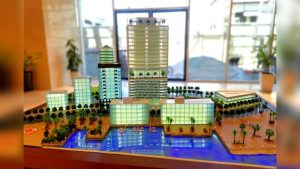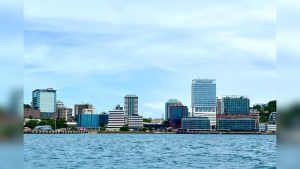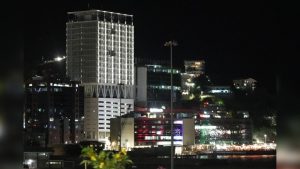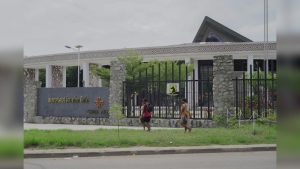One building rises above the others on Port Moresby’s skyline.
But the Noble Centre, built by a Chinese state-owned enterprise to be the tallest building in the country, sits empty.
The 23-storey tower has been deemed uninhabitable after the discovery of more than 70 defects, which regulators say are a threat to the building and to people’s safety.
Documents obtained by the ABC outline dozens of serious issues including mechanical, electrical and fire safety concerns.
The faults are at various times described as “highly illegal”, “non-compliant”, “poorly installed” and “dangerous”.
PNG is at the centre of a geopolitical contest of influence currently raging in the Pacific between nations including China, the US and Australia.
While Australia remains PNG’s biggest aid donor, China has been delivering infrastructure projects, road upgrades, loans, and medical assistance for years now.
But the uninhabitable skyscraper has sparked concerns about the quality and benefit of some of the aid and investment being delivered.
A symbol of ‘friendship’ between China and PNG
The Noble Centre was built by the China Railway Construction Engineering Group (PNG) Real Estate Co at a time when China’s growing presence in the country was attracting significant attention.
In 2017, the tower was touted as a symbol of “friendship between the two nations”.
“We are assuring the Papua New Guinea people that as a state-owned enterprise and guided by the Belt and Road policy, our company is confident with Papua New Guinea’s economy and will continuously support the nation’s economic development,” the general manager of the development, Shengwei Li, told local media in 2017.
He said it was the “single largest project by foreign investors in the real estate sector of Papua New Guinea” and would be the “tallest landmark” in Port Moresby.

In 2018, Chinese President Xi Jinping flew into Port Moresby for a state visit, arriving a few days ahead of other world leaders who were attending the APEC Summit.
The company said it had invested $95 million in the project, which was developed as an equity partnership with PNG Ports Corporation, a local state-owned entity.
PNG Ports had previously said China Railway Construction Engineering Group (PNG) Real Estate Co would build the tower on its land, and it would own the top two floors and contribute “a minor cost” to the joint venture.
In court documents seen by the ABC, the company said PNG Ports was to pay a “certain amount on instalment until an estimated [$15 million] was paid to fully acquire the two levels” under an agreement signed in 2015.
But the dream of a glittering tower over Port Moresby’s skyline quickly appears to have turned into a nightmare.
The ‘gorgeous and glistening’ building with 75 reported defects
Posts on the Noble Centre’s Facebook page in 2020 advertised office spaces, describing the building as “gorgeous and glistening” and promising prospective tenants it could “accelerate your business” and “enhance your life”.
But in September last year, the National Capital District Building Board wrote to advise that the occupancy certificate for the building had been rescinded.
The letter, obtained by the ABC, said the board had no other option “in the interest of public and immediate tenants’ safety”.
The decision was made after the PNG Ports Corporation ordered a technical report be done on the building, given growing concerns about its quality.
Among the dozens of building defects listed were switchboards that were “not to code and standards”, internal power points installed outside, “poorly installed” electrical systems and exposed conduits in fire zones, which were described as “highly illegal”.
There were calls for a “full review” of lighting and power as they found joins in the wiring “everywhere”.

The list of faults has also prompted concerns about the structural integrity of the building.
Issues were noted including rusting steel columns, external blockwork that was “out of alignment and unevenly placed”, unfilled blockwork cores and angle brackets that were rusting and “incorrectly installed”.
“One of the building board engineers did a report and he reckons structurally it’s OK, but I’m not sure,” the chairman of the city’s building board, Sir Luciano Cragnolini, told the ABC.
“There should be a second opinion. For safety, I would like a second opinion.”
There are also concerns about non-compliant fire stairs, non-automatic generators, sprinklers that are not up to standard, non-automatic fire pumps and a leaking diesel fuel tank.
“There are a lot of wrong things. That’s why [we took the occupancy certificate]. It just wasn’t safe,” Sir Luciano said.
In the letter, the building board called for further independent investigations to be carried out and for another report to be tabled, but Sir Luciano said that had not happened yet.
But despite whispers spreading around Port Moresby, local media was oddly silent about the building.
Court order stifles reporting on defects
The China Railway Construction Engineering Group (PNG) Real Estate Co went to court in Port Moresby in early October to prevent news coverage of any leaked documents about the building defects.
The interim district court order taken out on October 4 prevented all local media from reporting on the Noble Centre, including The Post Courier, which the court heard had obtained two reports from contractors.
In documents tendered to the court at the time, the company said it “refuted” the reports and stood by the building, saying it was “very much concerned about this report and the authorities not giving us our right of refusal”.

The claim said any news stories could do “irreparable damage” to the company’s reputation and business for the Noble Centre building.
“The complainant has spent hundreds of millions … to build the Noble Centre building,” another document read.
“Minor identifiable issues such as fire safety are easily fixable, and those issues are being addressed.”
The case was later struck out after neither the newspaper nor the company appeared at multiple court dates.
The China Railway Construction Engineering Group (PNG) Real Estate Co declined to respond to detailed questions from the ABC, saying the issues covered “ongoing business negotiations with our business partner PNG Ports Corporation”.
“We are yet to reach some understanding on how to proceed with the project works and how to continue our co-operations both technically and financially,” a spokesperson said in an email.
The company said it did not think “media exposure at this stage” would be good for the ongoing discussions and that as a “responsible business partner and out of business ethics” it would abide by the confidentiality terms in its agreement with PNG Ports.
“The issue between PNG Ports Corporation and our company remains purely an issue of business co-operation at company level and will not impact on any higher level on broad terms.”
PNG should have been on ‘high alert’
With multiple countries seeking influence in PNG, some experts say there needs to be more oversight over the kind of investment and aid that the country chooses to accept.
“PNG needs to be careful and selective, and not just go for whoever puts their hands up first and says, ‘We’ll fund you for this,'” Paul Barker from PNG’s Institute of National Affairs said.
That discretion is especially important when it comes to building infrastructure projects, according to Mr Barker.

“The systems are not functional and the checks that are meant to occur all the way through the process from the planning stages right through to completion clearly are not being applied,” he said.
Peter Aitsi, chairman of Transparency International PNG, said the involvement of politics in commercial operations also created a “murky area”.
Australia has also been increasing its involvement in PNG, seemingly to counter rising interest from China.
It has backed Telstra to purchase local telco Digicel and given loans to the PNG government for direct budget support for the first time in almost two decades.
“The donors also have to be more scrupulous,” Mr Barker said.
“They’re responding so as to be able to be seen to have that level of influence and to be able to out-compete with each other, to some extent.
At the end of last year, a notice appeared in local newspapers advising the Noble Centre had gone into receivership.
The building’s future is uncertain.
It is also unclear, what, if any, remedial work has been completed since the building faults were identified.
But each night, the vacant tower still lights up despite the concerns raised about electrical issues and fire safety standards.
SOURCE: ABC NEWS

